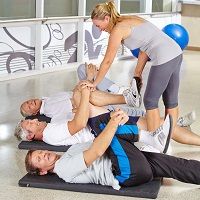Exercise Beneficial for Patients with Rheumatoid Arthritis
A study has demonstrated improvements in patients with rheumatoid arthritis who took part in exercise and/ or nutritional interventions.

Exercise programs can benefit rheumatoid arthritis (RA) patients, according to research published in the American Journal of Preventative Medicine.
Researchers from the University of Southern Carolina randomized 401 adult patients with RA received a self directed multi component exercise program in order to test the “First Step to Active Health” or “Steps to Healthy Eating” programs over the course of 12 weeks.
At baseline, 12 weeks, and 9 months, the patients turned in self monitoring logs, which included measures on physical activity, functional performance measures, and disease specific outcomes like arthritis symptoms and self efficacy. The patients were aged 56.3 years on average, were 85.8 percent women, 63.8 percent white, and had an average body mass index of 33.0.
For patients in the exercise programs, there were greater increases in physical activity over those patients in the nutrition program. Patients demonstrated improvements in areas of lower body strength, functional exercise capacity, lower body flexibility, pain, fatigue, stiffness, and arthritis management self efficacy.
There were more adverse events found in the exercise than nutrition control programs, but the researchers noted that only one was severe and that most of the adverse events were expected due to the increase in physical activity.
“The exercise program improves physical activity and both programs improve functional and psychosocial outcomes,” the authors concluded. “Potential reasons for improvements in the nutrition control condition are discussed. These interventions have the potential for large scale dissemination.”
Prior research discussed on HCPLive.com indicated that online intervention programs, which are designed to target exercise, are also effective for RA patients. In that study, physical activity increased when patients had more access to games and other engagement tools. Empowerment also improved in that study, especially when online social support groups were used.